Wales football: South Asian female fans see first game
- Published
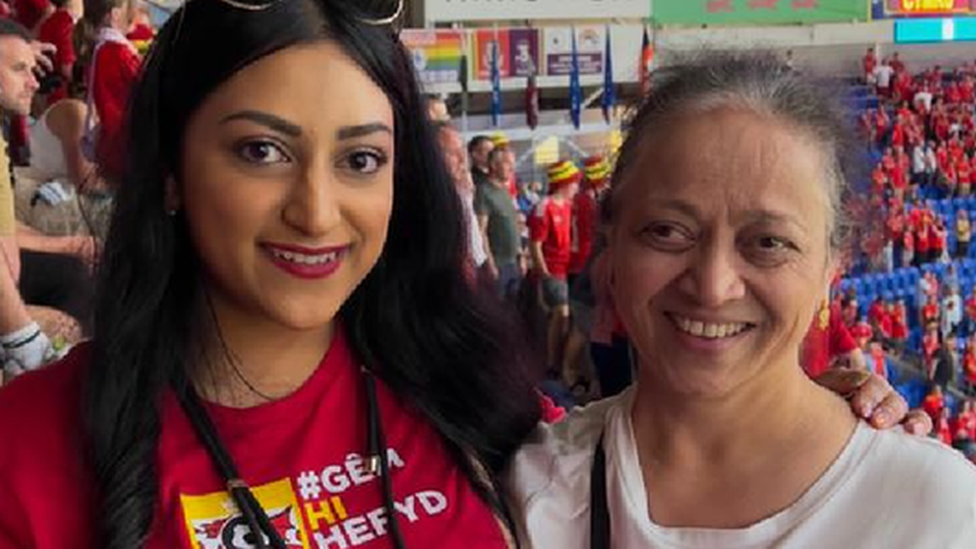
Roopa Vyas, with mum, Nayna, said: "In the Red Wall, everybody is welcome"
Welsh football groups are aiming to make the game more inclusive by encouraging female fans from south Asian backgrounds into the sport.
In a partnership with community groups, the Football Association of Wales (FAW) gave them 30 tickets to the Wales-Armenia Euros qualifier to "break down barriers and widen their fanbase".
It proved so popular that those who did not attend have been invited to a Cardiff restaurant on Monday to watch the next Euro qualifier away in Turkey.
And although the result wasn't what Wales wanted as they suffered a crushing 4-2 home defeat on Friday, for some of the women in the group, it was still exhilarating as their first Wales match in person.
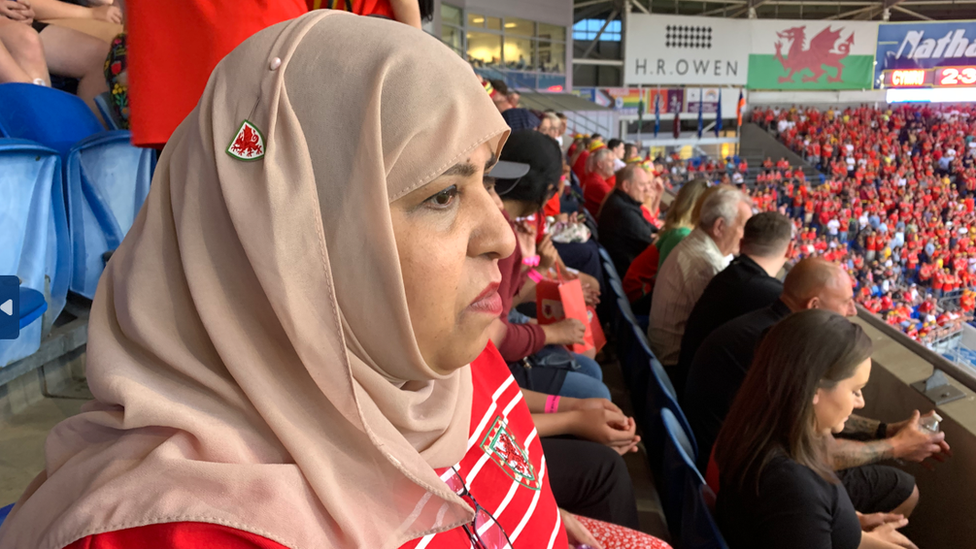
Rugby fan Riffat Minhas, who watched her first football match, said: "If you're visibly dressed differently, it's another thing to carry"
To try to find out what these barriers are, and whether initiatives like this are a success, I joined the group on what was also my first experience of watching football live.
I've always considered myself an armchair fan, and as a Welsh south Asian woman myself, felt I'd stick out like a sore thumb on game day. It turns out I wasn't alone.
Shazia Zahoor from Cardiff, who has been playing since she was 14, was discouraged by her father to pursue it.
"It's just the culture, people say 'girls don't play football', and when you say football, you instantly think men," says Shazia, who now plays for Caerphilly Castle Ladies.
Shazia wears the hijab and, in her 18 years of playing football, has never met a visibly Muslim player.
"I've had the odd racist comment and people have always asked why I cover my skin in hot weather, and I explain I want to for my faith."
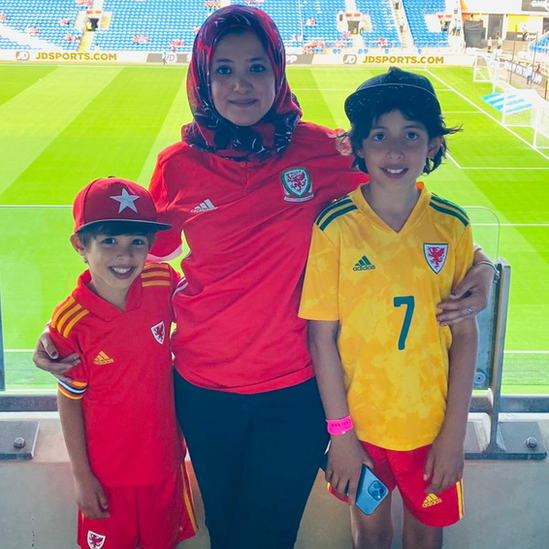
Shazia Zahoor took sons Ibrahim, 11, and Zakariya, five, to the game
She feels initiatives like this improve inclusivity in general: "I love it, it breaks down barriers. No matter what race, age, background, you can love football."
It's another story for sisters Eleeza, 17, and Rosheen, 19, who are being mentored as part of a FAW women in football scheme.
"Our dad got us into it," said Rosheen, who also referees with her sister. "It's our home away from the world. It's an escape."

Sisters Rosheen and Eleeza Khan are football referees and see football as an "escape"
"It's that buzz, especially when the anthem is on, we're in our jerseys, the crowd chants, it's such an amazing feeling."
The sisters have also experienced barriers.
"A lot of it is our own internal, imposter syndrome, of 'do we belong, are we Welsh enough?'," said Eleeza, who sits on the FAW Youth Council.
"We've gotten over it, and are reassured from days like today that we do fit in."
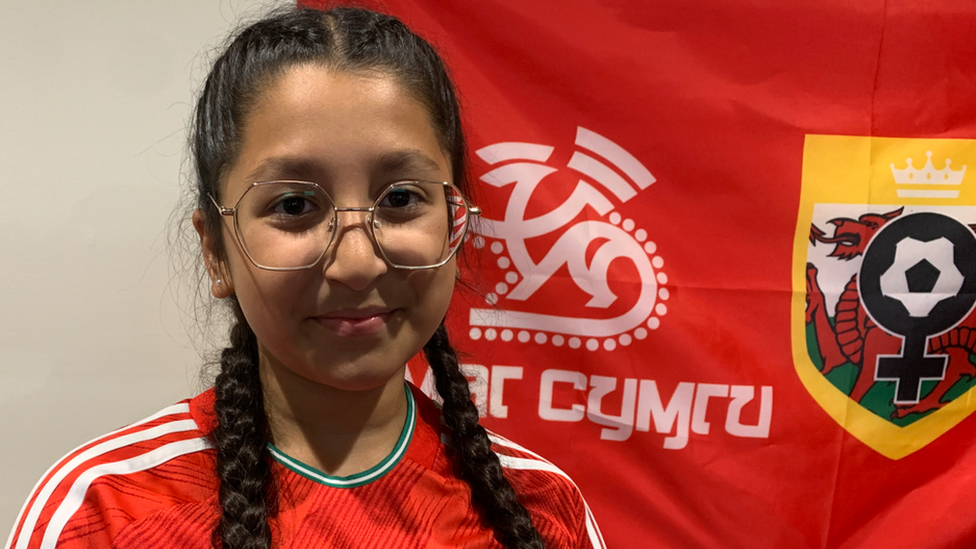
Despite walking in with the Armenian side, Lameesa managed to excitedly high-five every Welsh player on the field
It was a special day for Lameesa, 10, who was one of the mascots.
"It was scary, nervous, but also exciting," she said. "It was scary because there were so many people, but I felt proud."
As did her proud mum, Claire Arandjelovic, who "didn't expect to feel so emotional, and I've never felt so patriotic in all my life".
Roopa Vyas, director of Her Game Too, a fan-run campaign group that raises awareness of sexism in sport, said: "In the Red Wall [the name for Wales supporters], everybody is welcome, but barriers still exist for south Asian women and girls in sports, especially football.
"I've been part of the Red Wall since I was a child but I still don't see myself well represented in that crowd.
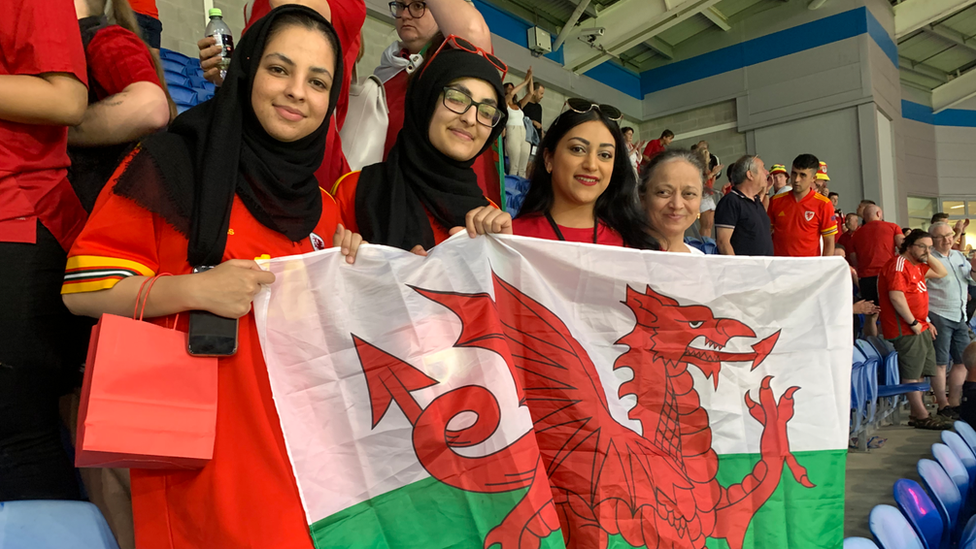
Sisters Rosheen and Eleeza Khan, and mother and daughter, Roopa and Nayna Vyas
"I'm often the odd one out. I've never let that stop me but it could stop others."
She added: "Initiatives like this, where people of similar cultural beliefs and backgrounds can come together in a safe space and enjoy a game of football where previously they would be watching at home and wanting to be part of the atmosphere are so important for that reason."
"Amar Cymru" which translates to "My Wales", is a group founded by Jalal Goni to make sports in general more inclusive.
"South Asian communities have been excluded from many sports, football being one.
"Amar Cymru wants to change those views and bring in everybody that we can; males, females, to watching games, playing and participating."
They have hosted two all-women's events so far and "the feedback was that more women do want to come to watch the matches, and they felt safe being there - that's the most important thing".
'We did stick out, but we also blended in'
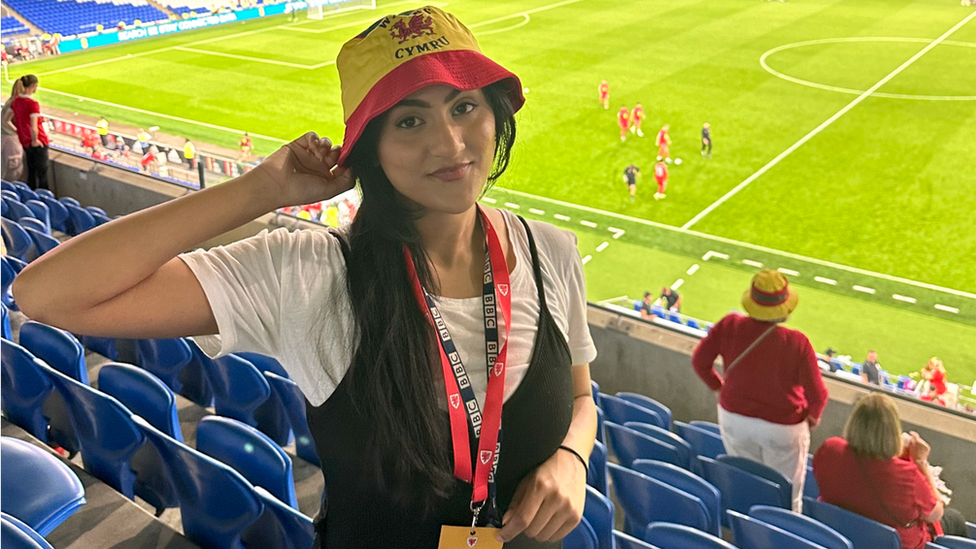
Reporter Shazia Ali: "Being there in person made me feel like a brick in the Red Wall"
Unfortunately, I couldn't have picked a worse game for my first.
It was obviously a crushing disappointment, and my heart was in my throat for most of the second half. But the peaks and dips of the game just made up the experience.
I screamed as the Armenian keeper clashed with Kieffer Moore, but not as loud as when Daniel James scored Wales' opener.
And nothing compared to the goosebumps inducing moment of hearing Hen Wlad Fy Nhadau thunder through the stadium.
The air wasn't just thick with humidity, but the heavy anticipation of knowing we could be on the brink of another Euros, off the back our World Cup journey.
Looking around, in the small pocket of smiling faces of people that looked liked me, I had the sense that this is what being Welsh means.
We did stick out, but we also blended in - just as raucous and regretful as everyone else.
Despite growing up with a football fanatic dad, I never saw myself as a frontline fan.
I'd never spotted many people from ethnic backgrounds in the crowds, and felt relegated to the living room when watching Wales.
But being there in person made me feel like a brick in the Red Wall.
Related topics
- Attribution
- Published17 June 2023

- Attribution
- Published16 June 2023
